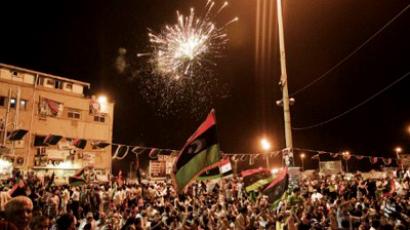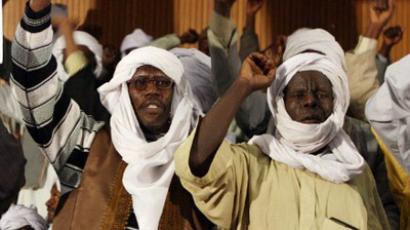Libya ready to use force against eastern separatists
Libya’s integrity will be defended by any means - even “with force” if needed - says Libyan “transitional” leader, Mustafa Abdel Jalil. His statement comes a day after the eastern tribal leaders declared autonomy for the region.
Mustafa Abdel Jalil warned people of the East that the “remnants of Gaddafi regime” have infiltrated the Cyrenaica region in order to exploit its people and resources.“We are ready to deter them, even with force,” AFP cited Jalil as saying at a conference in Misrata broadcast by local television. “We are not prepared to divide Libya.”But Patrick Hayes, a reporter for the online Spiked magazine, told RT Jalil has a very limited ability to project force.“It will be very hard to carry out those threats, because the NTC doesn’t really have control over the military in Libya. It’s very split at the moment. You have massive militias walking around, effectively uncontrolled, in Tripoli with weapons. You have Sirte, Gaddafi’s hometown, which is effectively an occupation, with militias from Misrata, which is also starting to break away. And the NTC has no real control over them. In fact, they don’t even have the means to pay these militias at the moment. So it’s by no means certain that you would be able to get the NTC to exert force. I think, in terms of Libya, it could very well splinter into a civil war where you have the east and the west battling one another.” Earlier Jalil stressed that “some Arab countries” are involved in this “conspiracy against Libya and Libyans,” by supporting and encouraging such a division between the East and the West to happen.On Tuesday, the cradle of the last year’s uprising against Gaddafi, Libya’s eastern Cyrenaica region with its center in Benghazi, declared semi-autonomy from the central government in the capital Tripoli. The gathering of the major tribal leaders and militia commanders decided that the new state, also known as Barqa, with its own parliament and police force, would run its affairs independently.While the East is seeking administrative independence, basically pushing forward the idea of federalism, the West is promoting “decentralization,” though centered in Tripoli.According to the national charter, which was presented on Wednesday, Libya is a parliamentary democracy with a decentralized system of administration. And Mustafa Abdel Jalil is eager to defend the principles of what he calls a “constitution for Libya's future.”However, Sara Marusek from the Syracuse University in Beirut told RT any talk of Libya's future is a bleak prospect at the point.“It’s looking very, very pessimistic for the status of peace and prosperity for Libyans. It really will take them many years to come out of this crisis. It just shows that the international community has not learned its lessons from Afghanistan and Iraq. There are also places like Somalia. Many people are drawing parallels, saying ‘perhaps Libya could become the next Somalia.’ In Somalia, several years back, there actually was some progress, some development, but it was under a regime that the West didn’t like. So they sent in the Ethiopian forces, and now people in Somalia are suffering and dying of starvation. Those against the West are becoming more radicalized, [which] creates more enemies. So the international community has to rethink before it assesses situations like Libya and Syria in the future.”














